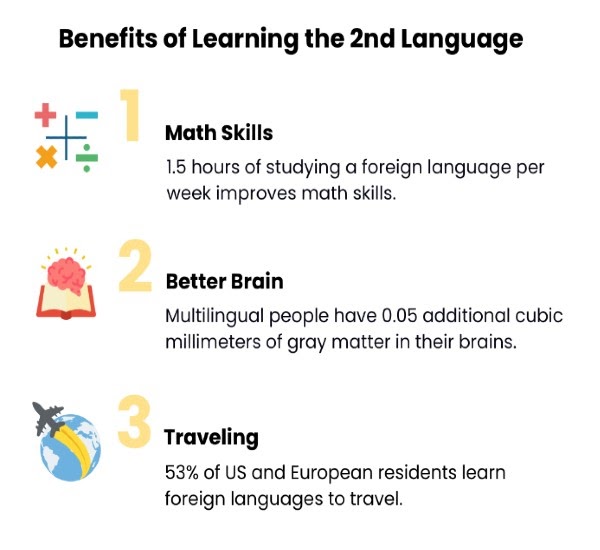It is hard to underestimate the cognitive effect of learning a 2nd language. Polyglots claim that each following language acquisition comes easier. It shows that we can train our ability to learn. Children who learn a second language at an early age are more creative and mentally flexible.
This article explores the multifaceted advantages of studying new languages. Improved cognitive abilities, communication, and math skills are the benefits you might get. Some scientists even claim that learning a foreign language can decrease the probability of mental illnesses. If you are still wondering whether to invest your time in this complicated yet useful undertaking, read further.

1. ➗ Benefits of Learning a Foreign Language: Math Skills
- People who know several languages think faster than those who know only their mother tongue. To be exact, coming up with the answer to a simple math task, like “What is 2 x 6 + 10: 5?” takes 3.5 seconds on average if you are a language learner and 4 seconds if you don’t speak any other language. That means that bilinguals outperform monolinguals by 12.5% when they need to solve easy math tasks.
- To perform better at math, you need to learn a foreign language – even if you learn it instead of math. In their research, ACTFL investigated how learning a second language helps children to perform better in school. Those who studied a foreign language outperformed their classmates in an MCAS test after two years of classes. And after seven years of learning a language, they became incomparably good at math.
- Even 1.5 hours of studying a foreign language per week can improve math skills. To find out how much time you need to spend on second language learning to perform better at math, we turn to the University of Michigan’s Language Learning Journal. Their research showed that only 1.5 hours per week of foreign language learning, for just one semester, is enough.
- Bilinguals also have better analytical skills. In one study, researchers asked children to choose the smallest of three toys placed in front of them. Monolingual children were correct about 50% of the time, while bilingual children picked the right object 77% of the time.
- Bilinguals demonstrate better logic than monolinguals. The International Journal of Bilingualism published an interesting study. In it, researchers investigated monolingual and bilingual children’s analytical skills and logic. There were 121 participants. The study showed that the 62 children who spoke a foreign language achieved higher results than monolingual kids.
These studies prove that learning a second language is a fantastic cognitive exercise. It can improve communication skills and be applied to mathematics, analytics, and problem-solving.
2. 🧠 Benefits of Learning a Foreign Language: Mental State
- When we learn a language, we fight depression, stress, and even delay mental illnesses. A study by the American Journal of Public Health reveals that children who speak two languages have fewer behavioral problems than monolingual children. Further, they rarely experience anxiety and stress.
- Better memory is another benefit of learning a second language. An American Academy of Neurology study shows that language learning creates new neural pathways. That means that information is processed through a more significant number of channels. This helps with short- and long-term memory.
- Foreign language learners can delay severe mental diseases related to aging. Dr. Bialystok’s research showed that people who speak two or more languages fend off the onset of dementia for an average of 4 years. The average age when bilingual patients begin to experience dementia symptoms is 75. They visit a doctor at 78. For monolingual patients, these ages are 71 and 75.
- Learning a language makes your brain grow. A study showed that the human brain increases after three months of learning a foreign language. Moreover, it increases in 4 different parts, which improves cognitive functions and helps learners to think faster. That means that polyglots apply a lot of mental effort every day. And mental exercises are an essential part of overcoming depressive diseases.
- When you start learning a foreign language, your vision of the world can change. Not only are you exposed to new expressions, ideas, and people. You practice making conversation, communicating, strengthening connections, and forming relationships. This is all wonderful for your well-being!
- Bilingual people recover from brain injuries faster. This is another benefit of learning a second language. A recent study of 600 Indian stroke survivors showed that the chances of recovery were twice as high for those who speak several languages as for monolinguals. In contrast, 40% of bilinguals, but only 20% of monolinguals, had normal cognitive functions.
- Multilingual people have 0.05 additional cubic millimeters of gray matter in their brains. The parietal lobes where additional gray matter is found represent the world around us.
3. 🎒 Educational Benefits of Learning a Foreign Language
- 15-20 minutes of learning a foreign language daily improves one’s knowledge of mother tongue. The International Journal of Humanities and Social Science investigated how learning Latin affects children’s knowledge of English. Kids in grades 2 to 4 studied a Latin program for one year. It consisted of 15–20 minutes of Latin lessons each day. An English vocabulary measure showed that children who studied Latin were functioning at their grade level. Those who hadn’t scored one year below their grade level.
- It’s much more effective to simultaneously learn several languages. This approach can save a lot of time. Instead of spending 1.5 years on becoming a fluent speaker in one language, it takes two years to master two of them.
- 54% of preschool-age bilingual children can distinguish words by their meaning! The majority of monolingual elementary students are not able to do so. They separate words by sound.
4. 👔 Career Benefits of Learning a Second Language
- 89% of people think multilingual workers add value to companies. 88% commented that they prefer to hire multilingual rather than monolingual people. This is the result demonstrated by the research of Eton Institute’s language development unit. It means that if you know one or more foreign languages, you have a better chance of getting a job. It’s easier for you to get a promotion or become an irreplaceable worker. This is especially true if your company is an international one.
- Your ability to speak a second language is reflected in the salary you’re paid. Kaplan International states that workers who speak more than one language can expect a salary uplift of up to 20%. A third of businesses search for employees specifically for their skills.
- The US immigrants who speak English earn 15–19% more than those who speak only their native language. Similar surveys in other countries had similar findings. In Canada, immigrants who speak one of the official languages and their mother tongue earn 10–12% more.
- Customers at restaurants give higher tips if they are served in their native language rather than in their second language. This is shown by the data from the European Journal of Marketing. At the same time, it doesn’t matter how experienced in the language a worker is. It’s more important for customers to hear people speaking their language.
- In the USA, interpreters and translators are included in the top 15 fastest-growing occupations. CNN forecasts there will be 25,000 translation and interpreter jobs available by 2023.
- 42% of UK citizens would move to another country to develop their careers if they could speak a foreign language.
Canada offers a particularly strong case study of how bilingualism shapes career opportunities. With English and French as official languages, employees who can operate confidently in both receive lots of benefits. For students and professionals alike, the Canadian experience demonstrates that bilingualism is not just a cultural asset but also a practical career advantage. If you’re exploring this topic further for an academic paper, Custom-Writing.com‘s Canadian-born specialists can provide expert guidance on essays about bilingualism and cross-cultural communication and even share some of their life experience.
5. ✈️ Benefits of Learning a Foreign Language: Traveling
- 53% of US and European residents learn foreign languages to travel. The creators of educational app Babbel conducted a survey to establish the motivations of their users. They asked 5,000 users why they decided to learn a foreign language. 53% of respondents answered that they want to communicate better while traveling. According to this statistic, traveling is the best motivation for people to learn a language. Other motivations included interest and keeping mentally fit.
- Doors open to people who speak a country’s official language. Another survey showed that 97% of respondents thought that knowing another language made traveling easier.
- Nowadays, there are excellent opportunities to become an international student. Since 1975, the number of international students in the USA has increased from 800,000 to 3,500,000. Each year this number increases by 12%.
It’s vital to keep in mind the benefits of language learning so that you stay motivated in your studies. You can accomplish a lot of things on your own if you know a country’s native language. You can understand excursions and movies, find your way without getting lost, and much more. So there’s more than enough reasons to look up that best online French dictionary or any other language that you wanted to learn and get to action. Good luck with your studies!
6. ✏️ Learning Second Language: FAQ
When Is the Best Time to Learn a Second Language?
In terms of age, the earlier, the better. A child’s brain is growing every day. That is why forming new neural connections becomes easier for kids. At 6–7 years old, language learning skills are at their peak. It is best to study a language between 10:00 AM and 2:00 PM and between 4:00 PM and 10:00 PM in terms of daytime.
How Long Does It Take to Learn a Second Language?
It takes about 480 hours or 5 hours a day for three months to reach essential fluency for easy languages. You will need 720 hours or 5 hours a day for about five months for more challenging languages. Most of us cannot dedicate five hours to learning a language without days off. That is why we study languages for years.
What Is the Best Second Language to Learn?
If you need it for a career, try Mandarin Chinese, German, or Arabic. To work at an international organization, French is a must. For traveling and daily communication, the best choice is Spanish, German, and French. Specialists in Chinese, Spanish, and Portuguese are in most demand as of today.
Which U.S. President Spoke English as a Second Language?
Martin Van Buren is still the only president whose English was a second language. He was born in the Dutch community of Kinderhook, New York. His first language was Dutch. The president spoke it at home for his entire life. He learned English at a local school in Kinderhook and improved it at the academy.
![200 Powerful Words to Use Instead of “Good” [Infographic]](https://custom-writing.org/blog/wp-content/uploads/2020/12/portrait-fair-haired-beautiful-female-woman-with-broad-smile-284x153.jpg)










